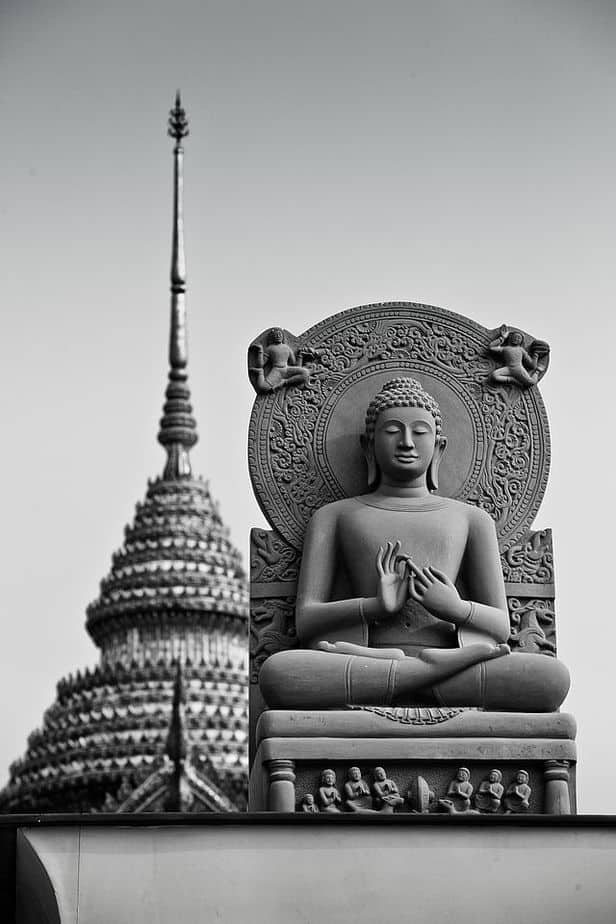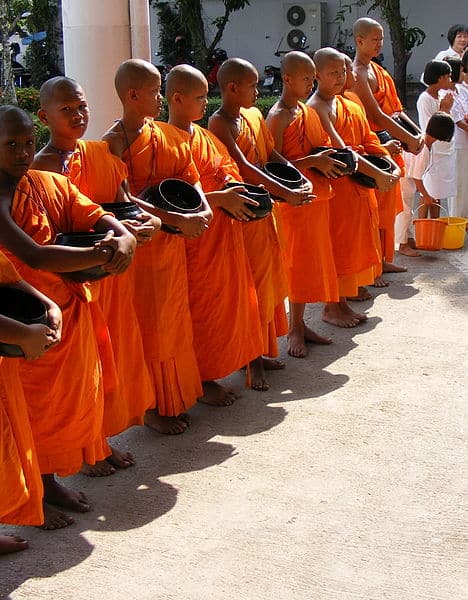A Brief Guide to Thailand’s Buddhist Universities
Many people would likely associate Thailand with impressive Buddhist temples and other artifacts and images, both ancient and modern, related to the ancient philosophy.
And it is true that there are in fact more than 40,000 temples in Thailand.
Further to that, the SE Asian nation of Thailand has long been one of those humid and tropical escapes that people from other climes interested in exploring avenues of both Buddhism and meditation have headed to, in a bid to taste a different culture and setting, while studying the Buddhist teachings and lifestyle approach.
However, due to the differing culture, climate, and often unexpected language barriers, this well-intended sojourn doesn’t always go as planned for many of these seekers.
(Check out our previous post on ‘How to become a Monk in Thailand for further insights.)
Traditionally, the practice and development of Buddhism in Thailand has been inherent in the culture and has played some role in the development of the country as well.
But in an ever-developing country with something of a rich heritage in the largely SE Asian Theravada Buddhist tradition, there are always newer, more accessible avenues that can be opened up.
What many people interested in learning about Buddhism in the Thai tradition may not be aware of is the fact that there are a number of Buddhist universities in the nation, although as it turns out this is not an entirely new thing.
Some of these institutes were established initially to accommodate natives and mainly those in the monkhood at that, who were seeking some form of academic qualification whilst studying the tradition and philosophy of the practice.
In fact, even today in some of the places in this post, many of the attendees are likely to be monks looking to achieve some form of academic qualification, which are prized and necessary commodities in the somewhat formal culture of Thailand.
But these days there are also a number of formal, recognised programs accessible to foreign attendees, monks or otherwise, who would be interested in gaining some form of higher education related to the study of Buddhism and its relative attributes. These studies cover all levels of tertiary education and are given in the English language.
So let’s take a closer look at what Buddhist studies in Thailand and some of the country’s Buddhist Universities entails.
Types of Study
Thailand has two main types of Buddhist studies.
These are categorised as monastic studies and secular sanghic studies – the basic difference between the 2 in simple terms being that one is for monks and one isn’t.
Monastic Studies
The monastic studies are operated and overseen by the Supreme Sangha Council of Thailand.
The programs are split into 2 main factions, namely: The study of Foundational Buddhism (Nak Dhamma) and the study of Pali (Nak Pali), which is the ancient language still used inherently in the Theravada tradition in Thailand.
This can be further divided in terms of the Foundational Buddhist study which comprises 3 levels, and the Pali studies which includes 9 levels.
The main temples in the country, as well as some overseas, participate in the programs as venues for the courses, which are for the most part undertaken in the Thai language.
Sanghic Studies
As far as the secular Buddhist study is concerned, there are 2 public universities and 1 private one. These universities offer secular degrees at Bachelor, Masters and Doctorate levels.
These institutions are rather similar to other public universities, aside from the fact that 30 units of study related to Buddhism form the core part of the courses.
The three universities, in order of establishment, are Mahachulalongkorana- rajavidyalaya University (founded in 1887), Mahamakut Buddhist University (founded in 1893), and the International Buddhist College (founded in 2005). All of these universities have faculties across the country, along with a few international ones.
1. Mahachulalongkornrajavidyalaya University
Mahachulalongkornrajavidyalaya University is one of the Buddhist universities that allows English-language speakers the opportunity to study with monks in Thailand. It is located in the impressive-looking Wat Mahathat Yuwarajarangsarit Rajaworamahavihara in Bangkok.
The university was established in 1887 with the intention of providing a place of higher learning for Buddhist monks, but also later on for laypeople who didn’t wish to ordain but were nevertheless interested in Buddhist studies.
It began offering classes to more and more diverse groups of students soon after its inception, and became a public facility in 1997. Aside from the main campus in Bangkok, Mahachulalongkornrajavidyalaya has faculties in more than a dozen provinces nationwide.
The university actually has five different faculties, 2 of which are related to the study of Buddhism, and one of them is international (described below).
These are namely the Faculty of Buddhism, and the Faculty of International Buddhist Studies, along with other faculties in Education, Humanities, and Social Sciences.
Location: 3 Mahathat Road, Phra Nakhon, Bangkok 10200
Website: www.https://muc.ac.th
2. The International Buddhist Studies College
The International Buddhist Studies College was established as a faculty and a graduate college of Mahachulalongkornrajavidyalaya University. It has been offering Master’s Degrees in four major subjects to international students since the year 2005.
The college initially only offered study programs in the local Thai language, but has since expanded its programs to cater for international attendees.
As far as this international faculty goes, the university offers programs in Chinese Buddhism, Buddhism and Management, and Buddhist Leadership for those pursing a Bachelor’s Degree.
The main Master’s programs offered by this university are Buddhist Studies, Philosophy, Pali, and Dhamma Communication.
There and also higher, more advanced programs such as Mahayana Buddhism, Buddhist Studies, and Philosophy. The latter two are conducted in English, and there is even a Ph.D. program available in English.
Address: 9 Lam Sai, Wang Noi District, Phra Nakhon Si Ayutthaya 13170
Phone: (+66) 035 248 000
Website: www.https://ibsc.mcu.ac.th
3. Mahamakut Buddhist University
Mahamakut Buddhist University (MBU) is the other one of the two public Buddhist universities in Thailand.
The institute was originally founded in 1893 by King Chulalongkorn for the purpose of providing some line of formal education for monks wishing to pursue it.
Mahamakut is regarded as the first university in Thailand to facilitate programs for Buddhist monks and novices. It was only approved as a ‘state university’ in 1997 by the government, which is when it was then officially named ‘Mahamakut Buddhist University.’
Undergraduate, post-graduate, and doctorate (PhD) degrees are all offered in this Buddhist University in Thailand, and bear the same significance and standard as those from other state universities.
Mahamakut Buddhist University is composed of four academic faculties in all, namely: Religion and Philosophy, Humanities, Social Sciences, and Education. The university first began offering master’s degree programs in 1987, with the Ph.D. program being established in 2005.
The institute also runs a teachers’ training program as well as various other academic services to the general public. The Faculty of Buddhist Studies offers 2 undergraduate and 3 post-graduate degrees with the courses running in both English and Chinese.
Although the university formerly catered to only Buddhist monks and novices, it now offers education both monks and laymen. The MBU has extended its boundaries beyond the main campus in Bangkok in fact, and has seven campuses and thirteen learning centres across the breadth of Thailand.
The Mahamakut Buddhist University is also involved in academic co-operation with the UK’s Oxford Centre for Buddhist Studies, in Oxford University, which has resulted in the institute hosting Buddhist Scholars the UK faculty to participate in dialogue between lecturers and students of the MBU.
The Fourth World Buddhist Summit in 2005 was held at the MBU, and played host to the Buddhist leaders of 23 countries, and an attendance of almost 4,000 international participants.
Address: 4006 Salaya, Phutthamonthon District, Nakhon Pathom 73170
Phone: (+66) 02 444 6000
Website: http://www.mbu.ac.th/
4. The World Buddhist University (W.B.U.)
The World Buddhist University is a relatively new and modern representation of what comprises a Buddhist University in Thailand.
This comes by way of one of the organisations main objectives which entails liasing with associated institutions across the world related to research, training and practice in the field of Buddhist studies, rather than having on-campus professors offering structured degree courses.
The focus of the W.B.U. is more in line with operating as a virtual university across various actual locations, under the guise of its mother organization, the World Fellowship of Buddhists (WFB).
The main office of the WFB is in Thailand, and through it the mission of the WB University is to contribute collaboratively, through academic and educational ends, to the efforts of Buddhist organizations dealing with any area of the education and propagation of Buddhism.
In order to do this, the WB University works with various universities and Buddhist academies, learning centres, research institutes and organizations, functioning on a variety of levels as something of a link between the international academic community and the WFB.
This has led to the development in recent years of a ‘Buddhist Big Data’ initiative (BBD), which has made resources available for public use. This is a space that aims to ensure that information on Buddhism can be accessed easily for public use.
The Buddhist study platform allows students to get a comprehensive overview of all Bachelors, Masters, and PhD programs, as well as any short courses, pathway programs and online learning options on Buddhism and Buddhist related fields that are on offer globally.
A wealth of information is made available to help people choose the right program according to their requirements.
Address: 616 Sukhumvit Rd, Khlong Tan, Khlong Toei, Bangkok 10110
Website: https://wbu.world/
Planning a trip to Paris ? Get ready !
These are Amazon’s best-selling travel products that you may need for coming to Paris.
Bookstore
- The best travel book : Rick Steves – Paris 2023 – Learn more here
- Fodor’s Paris 2024 – Learn more here
Travel Gear
- Venture Pal Lightweight Backpack – Learn more here
- Samsonite Winfield 2 28″ Luggage – Learn more here
- Swig Savvy’s Stainless Steel Insulated Water Bottle – Learn more here
Check Amazon’s best-seller list for the most popular travel accessories. We sometimes read this list just to find out what new travel products people are buying.





















